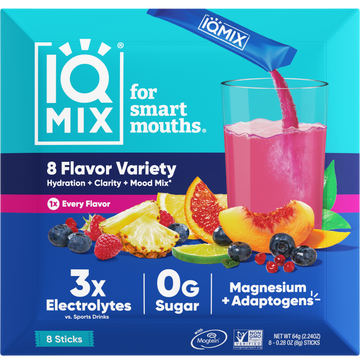Exercise is one of the best things you can do for yourself. It reduces your risk of many diseases, strengthens your bones and muscles, and gives you that post-exercise high. But did you know that working out also offers your brain some remarkable benefits?
That’s right—moving your body can help your brain work better. In fact, research overwhelmingly shows that exercise is one of the most important lifestyle habits to prevent cognitive decline and support mental health.
In this article, we’ll share how exercise supports brain health, the best type of exercise for brain health, and how to incorporate movement into your daily routine.
How Does Exercise Support Brain Health?
The positive links between physical exercise and brain health are currently a significant topic of research and discussion. Let’s take a look at the top benefits of exercise on the brain:
#1: Reduced Risk of Dementia
One of the biggest areas of research centers around the benefits of exercise for reducing the risk of memory loss and Alzheimer’s disease, even for people who are genetically at risk for the disease.
A 2017 study recruited 93 adults who had at least one parent with Alzheimer’s disease, at least one gene linked to Alzheimer’s, or both.[*] Participants who spent at least 68 minutes a day doing moderate physical activity had better glucose metabolism in their brains—a sign of healthy brain activity and reduced risk of dementia—compared to those who did less. Light-intensity exercise was not associated with similar benefits.
#2: Improved Reasoning and Executive Function
Research has shown that people who regularly exercise have greater brain volume in parts of the brain associated with problem-solving and executive function.[*]
Executive function refers to a set of mental skills, including memory, flexible thinking, and self-control. We use these skills daily to learn, work, maintain a healthy lifestyle, and manage daily life.
#3: Improved Mood
If you’ve ever gone for a run after a stressful day, you’ve likely experienced the mood-enhancing effects of exercise.
This effect is backed by plenty of research demonstrating that exercise can help alleviate short- and long-term depression.[*] In fact, the American Psychiatric Association recommends exercise as a stand-alone or complementary treatment option for depression.
How Does Exercise Lead to These Benefits?
Physical activity is thought to improve brain function and health through a variety of mechanisms.[*] Exercise increases a person’s heart rate, which increases blood flow and, consequently, oxygen to the brain.
Exercise also increases levels of a molecule called brain-derived neurotrophic factor (BDNF), which is known to help protect brain cells from degeneration and stimulate new neuron growth.
What’s the Best Type of Exercise for Brain Health?
Now for the million-dollar question: what type of exercise is best for boosting brain health and stimulating cognitive benefits? At this point in time, most research points to aerobic exercise as providing the greatest brain-boosting benefits. That’s likely because this type of exercise increases a person’s heart rate more than other types, which means more blood is pumped to the brain.
Other forms of exercise, such as strength training and power yoga, can also raise a person’s heart rate and thus support the brain, but there haven’t been enough studies on other forms of exercise to make definitive statements.
Nevertheless, an exercise routine should include various types of exercise, including aerobic, strength, and stretching for the sake of overall health, well-being, and enjoyment. Plus, diversifying the types of exercise you do and challenging yourself to learn a new activity can help keep your mind sharp and stimulated.
How Long and Hard Should You Exercise?
According to the CDC, the general recommendation for exercise amount and duration is 150 minutes of moderate-intensity exercise per week, plus two days of muscle-strengthening activity.[*]
An exact prescription for brain health is still being researched, but aiming for the CDC’s guidelines is a good goal.
At the end of a workout, you should still feel energized—not exhausted. If you feel drained post-workout, you’re likely unnecessarily overdoing it and potentially hindering the brain benefits you receive.
Experts suggest working out at about 60 to 70 percent of your maximum effort is ideal for cognitive health.[*] Exerting yourself beyond that seems to result in a decline in the positive effects of exercise on the brain.
It’s also important to note that everyone will have a different starting point. Someone who’s led a sedentary lifestyle for years with little physical activity should start with, say, ten minutes of aerobic exercise per day and work up from there.
A Sample Exercise Plan for Brain Health
Here’s a sample exercise plan to ensure you’re getting a good mix of aerobic exercise and resistance training to meet the 150-minute-per-week recommendation.
- Mon/Wed/Fri/Sun: 30 minutes of moderate-intensity aerobic exercise (jogging, biking, rowing, elliptical, swimming, dancing, etc.)
- Tues/Thurs: 30 minutes of resistance training (lifting weights, body-weight exercises, power yoga, etc.)
- Saturday: Rest or gentle movement such as tai chi
Experts suggest that at least six months of exercise is necessary to detect changes in cognitive functioning, so do your best to stick to a long-term exercise schedule like the one above.[*]
Support Your Activity with Brain and Body Nutrition
With an increase in activity, don’t forget to increase your nutrition and hydration needs as well. Have IQBARs and IQMIX on hand to keep your brain and body fueled, energized, and hydrated.
IQBAR is a keto and vegan protein bar that contains five key brain nutrients shown to support sustained cognitive energy, performance, and health. What’s more, IQBARs contain only 1-2 grams of sugar and 12 grams of pure plant-based protein per bar! To find your favorite flavors, try our Chocolate Lovers Variety Pack, Fruit Lovers Variety Pack, or 7-Bar Sampler.
IQMIX is a sugar-free electrolyte drink formulated with four nutrients shown to improve hydration, cognitive performance, and mood: sodium, potassium, magnesium L-threonate, and lion’s mane. It’s available in four delicious flavors: Blood Orange, Lemon Lime, Peach Mango, and Blueberry Pomegranate. Not sure which flavors to choose? Try our 8-Stick Sampler to find your favorites.
Seek Exercise You Enjoy
Exercise becomes much easier and more enjoyable if you’re doing an activity you genuinely enjoy. If you don’t like running or biking, try taking a dance class or playing pickleball. There are countless aerobic activities that can get your heart pumping and oxygen flowing.
Whatever forms of movement you choose, integrating exercise into your daily routine is an essential part of supporting your cognition, brain health, and overall well-being.



